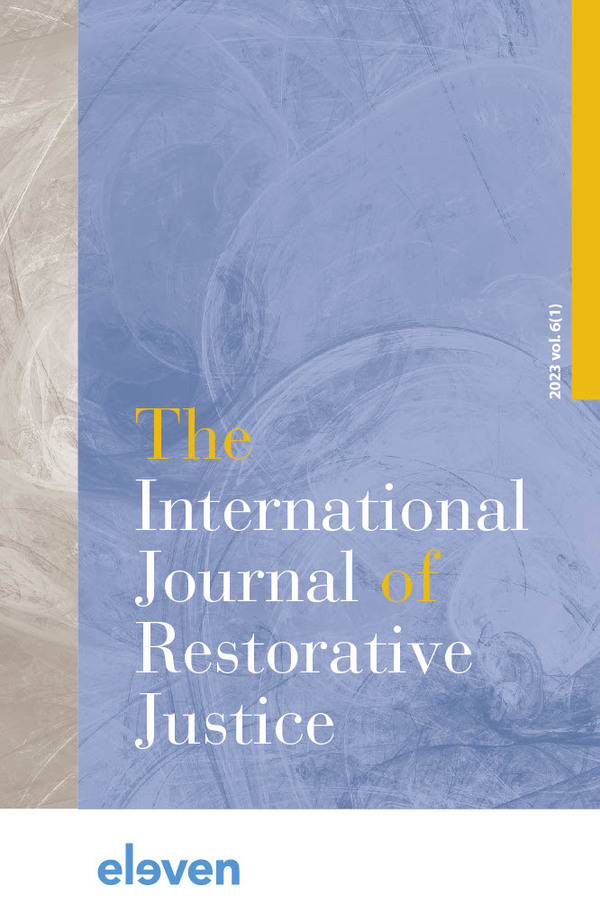|
While many empirical studies on restorative justice conferencing have been conducted in the context of ‘what works’, research on ‘how it works’ is scarce. Little is known about how, in what conditions and for whom restorative justice conferencing ‘works’. In this article, I aim to fill this gap in the literature by developing a concept of readiness. It refers to participants’ attitudes and emotional dispositions towards, and knowledge about, restorative justice conferencing and the other parties prior to the face-to-face dialogue process. I suggest that the concept of readiness may be a key independent variable to understand how restorative justice conferencing works because it reminds us that a restorative journey may begin before a face-to-face dialogue between participants take places. This article concludes by offering how it can be used in research on restorative justice conferencing. |


The International Journal of Restorative Justice
About this journalSubscribe to the email alerts for this journal here to receive notifications when a new issue is at your disposal.
| Editorial |
Restorative justice myopia |
| Authors | Tali Gal |
| Author's information |
| Article |
|
| Keywords | readiness, orientation, emotion, preparation, research methodology |
| Authors | Masahiro Suzuki PhD |
| AbstractAuthor's information |
| Article |
An Australian Aboriginal in-prison restorative justice process: a worldview explanation |
| Keywords | Australian Aboriginal, prison, recidivism, worldview, restorative justice |
| Authors | Jane Anderson |
| AbstractAuthor's information |
|
As a response to the over-representation of Australian Aboriginal offenders in Western Australian prisons and high rates of reoffending, this article presents a sketch of Western and Australian Aboriginal worldviews and core symbols as a basis for understanding the rehabilitative-restorative needs of this prisoner cohort. The work first reviews and argues that the Western-informed Risk-Need-Responsivity model of programming for Australian Aboriginal prisoners has limited value for preventing reoffending. An introduction and description are then given to an Aboriginal in-prison restorative justice process (AIPRJP) which is delivered in a regional Western Australian prison. The process is largely undergirded by an Australian Aboriginal worldview and directed to delivering a culturally constructive and corrective intervention. The AIPRJP uses a range of symbolic forms (i.e. ritual, myth, play, art, information), which are adapted to the prison context to bring about the aims of restorative justice. The article contends that culturally informed restorative justice processes can produce intermediate outcomes that can directly or indirectly be associated with reductions in reoffending. |
| Article |
The new international restorative justice framework: reviewing three years of progress and efforts to promote access to services and cultural change |
| Keywords | restorative justice, criminal justice reform, cultural change, international guidelines, international law |
| Authors | Ian D. Marder |
| AbstractAuthor's information |
|
The years 2018-2020 saw a number of new international legal instruments and guidelines relating to restorative justice. In 2018, a landmark Recommendation adopted by the Council of Europe and a Resolution by the Organization of American States encouraged its use in their regions. In 2019, the Milquet Report proposed amending a European Union Directive to promote restorative justice as a diversion from court, while in 2020, the European Union adopted a new Victims’ Strategy, and the United Nations published a revised Handbook on Restorative Justice Programmes. This article identifies and analyses the principal developments in this new international framework. It demonstrates the growing consensus on the potential applicability of restorative justice for all types of offences, and the emerging recognition that restorative justice should aim to satisfy the needs of all participants. It also explores statements endorsing the use of restorative justice beyond the criminal procedure and advising criminal justice institutions to utilise restorative principles to inform cultural change. The paper concludes that implementing international policies domestically requires justice reform advocates to build strong, trusting relationships, and organise inclusive partnerships, with all those who hold a stake in the development of restorative justice. |
| Notes from the field |
Twenty years of growing support for restorative justice: presenting the second edition of the UN Handbook |
| Authors | Jee Aei (Jamie) Lee and Yvon Dandurand |
| Author's information |
| Response |
Restorative justice domesticated |
| Authors | Lode Walgrave |
| Author's information |
| Response |
Reflecting on structural violence and restorative justice in Brazil: the relevance of the UN handbook |
| Authors | Petronella Maria Boonen |
| Author's information |
| Notes from the field |
Developments in the use of restorative justice for hate crime |
| Authors | Mark Walters |
| Author's information |
| Response |
Reconceptualising hate crime in a restorative framework |
| Authors | Robert Peacock |
| Author's information |
| Response |
Restorative justice for hate crime in Scotland: the story so far |
| Authors | Rania Hamad and Gael Cochrane |
| Author's information |
| Conversations on restorative justice |
A talk with Mary Koss |
| Authors | Albert Dzur |
| Author's information |


